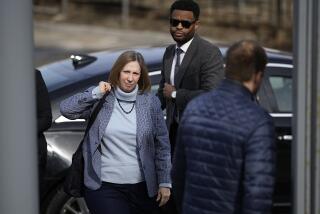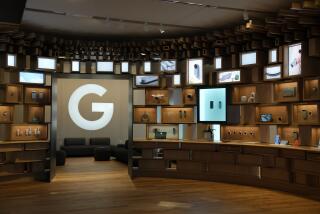Orange County man is accused of being a spy
The Justice Department on Monday announced the indictment and arrest of a longtime aerospace worker in Southern California for allegedly passing classified documents to China in an elaborate espionage endeavor that spanned two decades and exposed trade secrets from the space shuttle, the Delta IV rocket and the C-17 military transport aircraft.
Dongfan Chung, 72, a native of China who became a naturalized U.S. citizen and adopted the nickname “Greg,” was arrested at his home in Orange and taken before a federal judge in Santa Ana. He was released after posting a $250,000 property bond.
According to Thomas P. O’Brien, the U.S. attorney in Los Angeles, Chung spent more than 30 years as an engineer in the aerospace industry, working for Rockwell International and Boeing, and had a security clearance. He spied for his home country out of love for “the motherland” rather than from a desire to get rich, O’Brien said.
The Justice Department also announced the arrests of three others in Virginia and Louisiana in an unrelated case of espionage for China. Officials said they were still assessing the damage to national security from both cases.
Kenneth L. Wainstein, assistant U.S. attorney general for national security, said the two actions were the latest in an escalation of espionage operations by China. Calling China “among the most aggressive” in collecting information about sensitive U.S. programs, Wainstein said American defense firms in 2006 reported a 43% increase in suspicious foreign contacts.
“While the collapse of the Soviet Union ended the Cold War,” he said, “it did not end the threat from the foreign intelligence services.”
The 25-page indictment against Chung cited letters, memos and other messages -- some dating to 1979 -- between Chung and his alleged handlers inside the People’s Republic of China. They allegedly show that he sent classified manuals and other data to China and made personal presentations to Chinese aerospace workers.
“There is a strong sense of loyalty for Mr. Chung back to China,” O’Brien said, “and an appreciation from officials in China to Mr. Chung for his work on their behalf.”
In one early letter, for instance, Chung allegedly wrote that he was proud of others’ achievements for “the motherland” and that he “would like to make an effort to contribute.”
His handlers urged him on. “We are all moved by your patriotism,” professor Chen Lung Ku of the Harbin Institute of Technology in China allegedly told him. “Your spirit is an encouragement and driving force to us. We’d like to join our hands together.”
Officials at the Chinese Embassy in Washington did not return phone calls Monday seeking comment.
Chung first surfaced in the federal prosecution of Chi Mak, a Chinese American engineer convicted in May of conspiring to send information about U.S. Navy technology to China. Prosecutors identified Mak, 67, as a sleeper agent who began preparing for his assignment in the U.S. in the 1960s, when he moved to China from Hong Kong.
Mak was convicted of conspiracy to violate export control laws, attempting to violate export control laws, acting as an unregistered agent for China and lying to federal agents. He is scheduled to be sentenced March 24 and faces a maximum of 45 years in prison.
As part of the Mak investigation, the FBI served search warrants on Chung’s home in 2006, O’Brien said, and retrieved much of the evidence they used to name him in a sealed federal grand jury indictment last week.
Chung was indicted on eight counts of economic espionage, one count of conspiracy to commit economic espionage, one count of acting as an unregistered foreign agent, and additional charges of obstruction of justice and making false statements to FBI agents. O’Brien said that, if convicted, Chung faces a maximum punishment of “well over 100 years in federal prison.”
At Chung’s custody hearing Monday in Santa Ana, defense attorney Ken Miller argued that Chung was not a flight risk, noting that his client has known about the government’s investigation for 18 months and chose not to flee the country, preferring to stay and fight the charges.
Outside the courtroom, Miller said his client was innocent but declined to comment on the evidence or charges. “The key thing is to remember you’ve got a man who stayed here to face the charges,” he said.
Chung went to work for Rockwell in 1973 in Downey and later joined Boeing in Huntington Beach, retiring in 2002. For the next few years he worked as a contractor for Boeing.
According to the indictment, he allegedly began to regularly conceal documents at home and also traveled to China and gave lectures on space shuttle technology and other programs.
At one point in 1985, he allegedly told a handler, Qinan Chen, that it would be a “real pleasure” for them to have technological exchanges.
He reportedly advised the Chinese that he had worked on U.S. helicopters, adding that “the overall picture could still be explored.” And he allegedly collected U.S. aviation manuals for transfer to China.
In 1986, Gu Weihao of China’s Ministry of Aviation told Chung that passing information through Mak would be “faster and safer” and added: “It is your honor and China’s fortune that you are able to realize your wish of dedicating yourself to the service of your country.”
In the other, unrelated, spy case that officials announced Monday, Tai Shen Kuo, 58, and Yu Xin Kang, 33, both of New Orleans, and Gregg William Bergersen, 51, of Alexandria, Va., were charged in an alleged conspiracy that Wainstein called a “classic espionage operation” in which a foreign government paid for information.
Bergersen, a U.S. weapons systems policy analyst, allegedly funneled information to Kuo and Kang for transfer to China. Kuo and Kang face life in prison if convicted; Bergersen could get a maximum punishment of 10 years.
Much of the information that allegedly was traded included classified national defense documents, such as material related to U.S. military sales to Taiwan.
The indictment did not say how much Bergersen was allegedly paid. But it cited FBI surveillance that reportedly caught Kuo placing a half-inch-thick folded stack of cash into Bergersen’s shirt pocket and Bergersen telling Kuo to be careful because “I would be fired for sure. . . . I’d go to jail.”
Serrano reported from Washington and Reza from Santa Ana.
More to Read
Start your day right
Sign up for Essential California for news, features and recommendations from the L.A. Times and beyond in your inbox six days a week.
You may occasionally receive promotional content from the Los Angeles Times.







